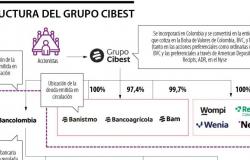Los first two years of life of a child are determinants in their cognitive, physical, and school performance. during this period of constant growth and development, the bases of their taste preferences are also established. Therefore, it is essential that parents and caregivers encourage healthy child feeding habits from an early age.
Providing a balanced diet is a means of prevention and control, in the short and long term, of common ailments of this age such as anemia, malnutrition, obesity and constipation. It is also a primary factor to reinforce the immune system and prevent small colds, flu and other infections that are easily infected in nurseries and schools.
In an interview for Bienmesabe, the intensivist pediatrician Huniades UrbinaMD, PHD and current president of the National Academy of Medicine in Venezuelashare some Basic tips About energy and nutritional needs in first years of life of a child.
The first 1000 days
The pediatrician highlights the crucial importance of the first 1000 days of life (from conception to two years), a stage where Organs, tissues and neuronal connections are formed essential for the child’s future and his potential as an adult.
“Prevention is fundamental,” warns the doctor, “since Nutritional deficiencies or errors In these first 1000 days they can lead to irreversible consequences for the individual. “
The specialist recommends the following:
1.- Exclusive breastfeeding from 0 to 6 months
It is considered a unique and irreplaceable food, a child law, as well as maternal responsibility.
The specialist emphasizes his primordial role In the first six months to ensure vital nutrients, healthy development, infections prevention and strengthening the maternal-filial loop. Breastfeeding fully satisfies the baby’s hydration needs.
2- neither salt nor sugar up to two years
The addition of salt or sugars (white, brunette, syrups, honey) is not recommended, being preferable to opt for the natural sugar of whole fruits.
The expert emphasizes that Early sugar intake can reprogram fat cells, favoring overweight and preference for long -term unhealthy foods.
3.- Whole fruits, not juices
It is preferable to offer fruits in pieces or crushed with a little water, thus preserving its nutritious components.
As a complement to breast milk, it is suggested to include A fruit in food and another like snack.
4.-Complementary food
It should be started From six months of age with the introduction of some foods; First liquids, then in porridge or crushed so that the child adapts to new characteristics.
A year oldthe child must have a diet appropriate to his age and what the family group eats.
5.- A touch of creativity and colors
If the food enters through the eyes, as they say, The presentation of the dish is key to awakening child appetite.
Fruits and vegetables of different colors, textures and flavors should be chosen, both raw and cooked.
6.- Include vegetables (and tricks to eat them)
When children have a High animal protein diet (meats, eggs and cheeses) Increases the production of acids in the body. To counteract this and prevent metabolic acidosis, it is essential to incorporate vegetables in meals, providing the necessary alkaline balance.
The signs of acidosis They appear in loss of appetite, early satiety, children who eat less and less and have difficulty gaining weight.
-How to include vegetables? The specialist insists is being creative in the kitchen: Add gratin cheese to broccoli or cauliflower; GRALL Carrot in hamburgers; prepare colorful arepas With chia, seeds, beets or carrot.
These changes not only make the most attractive dishes, but also They encourage the habit of consuming vegetables
7.- Be careful with empty calories
From the first year of age, it is recommended that children consume between 800 to 1200 kilocalories a day, adjusting to his level of physical activity. This caloric intake must be distributed in three main meals (breakfast, lunch and dinner) and two snacks, prioritizing foods that provide essential nutrients for their growth and development.
However, the pediatrician warns about a problem common in families with limited access to sufficient and nutritious foods: the Frequent consumption of spaghetti, rice, bread, sweets, soft drinks and even unrique arepas. These foods, called “empty calories,” generate satiety but They lack vital nutrients For growth, becoming mainly body fat.
8.- Do not forget to drink water
The recommendation for children, depending on age, is to take between 4 to 6 glasses of daily water. This amount must be distributed throughout the day, During or after meals, to ensure optimal hydration, essential for the proper functioning of the entire body.
In the case of children who practice sports they will require additional water intake to compensate for fluid loss.
3 indispensable children’s food
During childhood, energy and nutritional needs are essentially high. It is important, emphasizes Dr. Urbina, that mothers know and incorporate the three basic food groups that are essential In the child’s daily diet: Proteins, carbohydrates and vegetables.
And balanced and varied dish must include a portion of proteins which are essential for muscle development and growth (present in meats, fish, dairy, eggs, legumes and nuts).
Besides, Carbohydratesas a source of energy (such as oatmeal, rice, pasta and bread, preferably integral, potatoes, sweet potatoes, cassava, beans and lentils). And finally, the vegetablesa treasure of fibers, vitamins and minerals (from the Green spinach leaves, chard, broccoli and cauliflower, also tomato, carrot, cucumber, onion, beet, celery, auyama).
As to The recommended protein portion must be 90 grams Approximately (the size of the palm of the hand), details, Dr. Urbina. It is important to highlight, adds the expert, which The grains They are also a valuable source of protein, offering an alternative to diversify the diet and compensate for possible limitations in the consumption of other protein sources.
Once the child has the yearyou can start complementing feeding with full milk, preferably pasteurized. “Before that time it can cause damage to intestinal villi and bleeding micros,” warns the specialist.
Finally, to enhance the benefits of these foods, it is suggested to prioritize healthy cooking methods such as boiling, baking or roasting, leaving aside fried and ultraprocessed foods.
Should we supply vitamin accessories?
Dr. Urbina insists that a balanced daily diet, including proteins (both vegetables and animal), carbohydrates and vegetables, It provides most of the vitamins and minerals necessary for the child.
Supplementation is only justified before the detection of a specific deficit In a patient, confirmed by LABORATORY STUDIES OR MEDICAL EVALUATION. The specialist alerts about self -medicationpointing out that managing vitamin supplements without a diagnosed deficiency is unnecessary, since the body will eliminate excess through urine or feces.
To close, Dr. Huniades Urbina calls future mothers to procure a adequate nutrition during pregnancy and that meet the prenatal controls that will guarantee good health of the newborn.
Likewise, it emphasizes, the importance of go regularly to the pediatrician o Specialist in childcare to receive professional guidance and accompaniment in the child’s adequate growth and development process.
With the stimulus information






